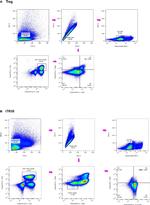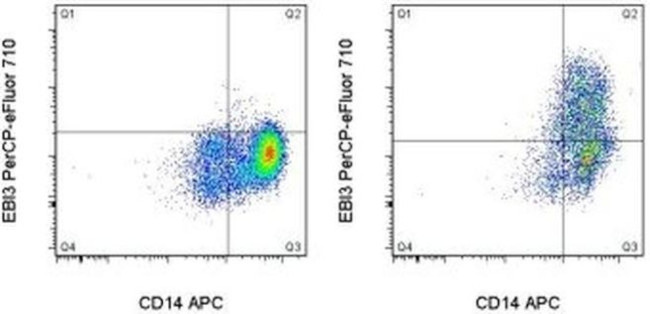Search Thermo Fisher Scientific
Invitrogen
EBI3 (IL-27 subunit) Monoclonal Antibody (ebic6), PerCP-eFluor™ 710, eBioscience™
FIGURE: 1 / 2
EBI3 (IL-27 subunit) Antibody (46-7358-42) in Flow


Product Details
46-7358-42
Species Reactivity
Published species
Host/Isotype
Recommended Isotype Control
Class
Type
Clone
Immunogen
Conjugate
Excitation/Emission Max
Form
Concentration
Purification
Storage buffer
Contains
Storage conditions
Shipping conditions
RRID
Product Specific Information
Description: This ebic6 monoclonal antibody reacts with human Epstein-Barr Virus Induced Gene 3 (EBI3). EBI3 can be expressed and secreted as monomers or homodimers, and was first identified in virally-infected B cells. It is also believed to be secreted as a homodimer by cells of the trophoblast, where it may play a role in immune tolerance during pregnancy.
Additionally, EBI3 is a component of two of the four members of the interleukin (IL)-12 family of heterodimeric cytokines. EBI3 was first found to heterodimerize with p28 (IL-30) to form IL-27, which is secreted by antigen-presenting cells in response to pro-inflammatory stimuli. IL-27 has been shown to have both pro-inflammatory and anti-inflammatory effects. It influences the commitment of CD4+ T-cells toward the Th1 lineage by inducing the expression of the T-bet transcription factor and the upregulation of IL-12R beta 2. Its anti-inflammatory functions include the suppression of Th2 and Th17 proliferation and differentiation.
More recently, EBI3 was also found to dimerize with the IL-12 subunit, p35 to form IL-35. The biology of IL-35 is incompletely understood, but it is believed to be unique among the IL-12 family members in its expression and function. It is produced by regulatory T cells, and appears to have immunoregulatory functions. IL-35 has been found to suppress the proliferation and function of effector T cells, and has also been observed to induce a regulatory phenotype on naive CD4+ cells cultured in its presence.
ELISA results from the culture of human dendritic cells stimulated shown above suggests that at least some of the EBI3 detected by flow is dimerized with p28 to form IL-27. Testing with ebic6 in the context of IL-35 is currently in process. For more information, please contact technical support.
Applications Reported: This ebic6 antibody has been reported for use in intracellular staining followed by flow cytometric analysis.
Applications Tested: This ebic6 antibody has been pre-titrated and tested by intracellular staining followed by flow cytometric analysis using the Intracellular Fixation & Permeabilization Buffer Set (Product # 88-8824) and protocol. Please refer to Best Protocols: Protocol A: Two step protocol for (cytoplasmic) intracellular proteins located under the Resources Tab online. This antibody can be used at 5 µL (0.03 µg) per test. A test is defined as the amount (µg) of antibody that will stain a cell sample in a final volume of 100 µL. Cell number should be determined empirically but can range from 10^5 to 10^8 cells/test.
PerCP-eFluor® 710 can be used in place of PE-Cy5, PE-Cy5.5 or PerCP-Cy5.5. PerCP-eFluor® 710 emits at 710 nm and is excited with the blue laser (488 nm). Please make sure that your instrument is capable of detecting this fluorochrome. For a filter configuration, we recommend using the 685 LP dichroic mirror and 710/40 band pass filter, however the 695/40 band pass filter is an acceptable alternative.
Our testing indicates that PerCP-eFluor® 710 conjugated antibodies are stable when stained samples are exposed to freshly prepared 2% formaldehyde overnight at 4°C, but please evaluate for alternative fixation protocols.
Excitation: 488 nm; Emission: 710 nm; Laser: Blue Laser.
Filtration: 0.2 µm post-manufacturing filtered.
Target Information
EBI3 (Epstein-Barr virus Induced-3) is a secreted glycoprotein of the hematopoietin receptor family. It plays a critical regulatory role in the induction of Th2-type immune responses and the development of Th2-mediated tissue inflammation in vivo, which may be mediated through the control of iNKT cell function. EBI3 dimerizes with p28 and p35 subunits of IL-12 to form new proteins IL-27 and IL-35, respectively. IL-27 is an early product of activated antigen presenting cell that is produced upon TLR ligation. It negatively regulates Th17 cell differentiation. EBI3 is widely expressed and its expression in dendritic cell is transcriptionally regulated by TLR signaling via MyD88 and NF-kappaB during innate immune responses preceding cytokine driven Th cell development. EBI3 signal inhibits delayed-type hypersensitivity responses by suppressing IL-17 production and inducing IL-10 hyperproduction. EBI3 may play a novel role in controlling tumor metastasis via lung CD8+ T cells, and its deficiency is associated with a diminished production of Th2 cytokines which are known to regulate allergic airway inflammation in asthma. Targeted deletion of EBI3 protects mice from lung metastasis.
For Research Use Only. Not for use in diagnostic procedures. Not for resale without express authorization.
How to use the Panel Builder
Watch the video to learn how to use the Invitrogen Flow Cytometry Panel Builder to build your next flow cytometry panel in 5 easy steps.
Bioinformatics
Protein Aliases: cytokine receptor; EBV-induced gene 3 protein; Epstein-Barr virus induced gene 3; Epstein-Barr virus-induced gene 3 protein; IL-27 subunit beta; IL27 subunit; IL35 subunit; Interleukin-27 subunit beta
Gene Aliases: EBI3; IL-27B; IL27B
UniProt ID: (Human) Q14213
Entrez Gene ID: (Human) 10148

Performance Guarantee
If an Invitrogen™ antibody doesn't perform as described on our website or datasheet,we'll replace the product at no cost to you, or provide you with a credit for a future purchase.*
Learn more
We're here to help
Get expert recommendations for common problems or connect directly with an on staff expert for technical assistance related to applications, equipment and general product use.
Contact tech support

